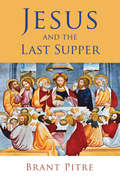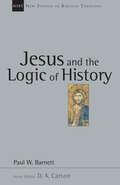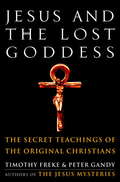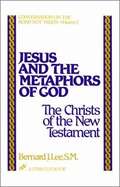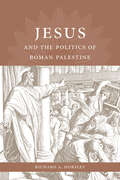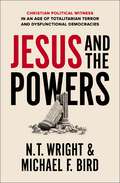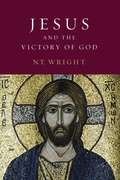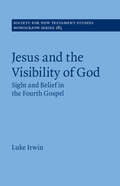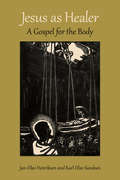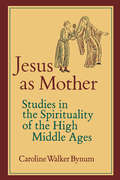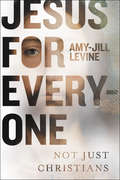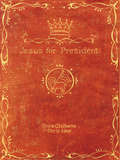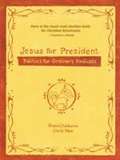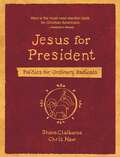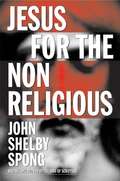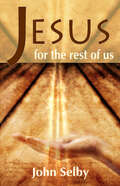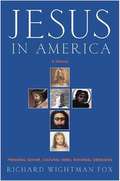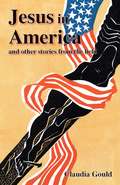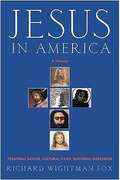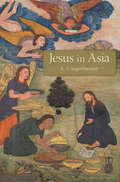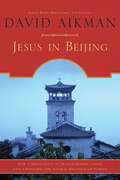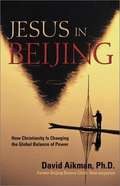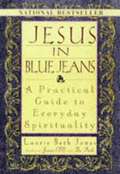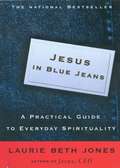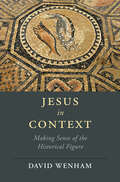- Table View
- List View
Jesus and the Last Supper: Unlocking The Secrets Of The Last Supper
by Brant PitreWho did Jesus of Nazareth claim to be? What was his relationship to early Judaism? When and how did he expect the kingdom to come? What were his intentions? Though these key questions have been addressed in studies of the historical Jesus, Brant Pitre argues that they cannot be fully answered apart from a careful historical analysis of the Last Supper accounts. Yet these accounts, both by the Gospel writers and by Paul, are widely neglected by contemporary Jesus research. In this book Pitre fills a notable gap in historical Jesus research as he offers a rigorous, up-to-date study of the historical Jesus and the Last Supper. Situating the Last Supper in the triple contexts of ancient Judaism, the life of Jesus, and early Christianity, Pitre brings to light crucial insights into major issues driving the quest for Jesus. His Jesus and the Last Supper is sure to ignite scholarly discussion and debate.
Jesus and the Logic of History (New Studies in Biblical Theology #Volume 3)
by Paul W. BarnettAt the heart of the Christian faith stands a man, Jesus of Nazareth. Few people seriously question whether Jesus existed in history. But many, influenced by the more skeptical scholars, doubt that the Christ of orthodox Christianity is the same as the Jesus of history. In this New Studies in Biblical Theology volume, historian Paul W. Barnett lays these doubts to rest. He uncovers the methodological weaknesses present in some forms of critical scholarship, demonstrating a failure to account for important early evidence about Jesus. Once the evidence is properly marshalled, a picture of Jesus emerges that fits well with orthodox belief in him. Addressing key issues in biblical theology, the works comprising New Studies in Biblical Theology are creative attempts to help Christians better understand their Bibles. The NSBT series is edited by D. A. Carson, aiming to simultaneously instruct and to edify, to interact with current scholarship and to point the way ahead.
Jesus and the Lost Goddess: The Secret Teachings of the Original Christians
by Timothy Freke Peter GandyWhy Were the Teachings of the Original Christians Brutally Suppressed by the Roman Church?* Because they portray Jesus and Mary Magdalene as mythic figures based on the Pagan Godman and Goddess* Because they show that the gospel story is a spiritual allegory encapsulating a profound philosophy that leads to mythical enlightenment* Because they have the power to turn the world inside out and transform life into an exploration of consciousnessDrawing on modern scholarship, the authors of the international bestseller The Jesus Mysteries decode the secret teachings of the original Christians for the first time in almost two millennia and theorize about who the original Christians really were and what they actually taught. In addition, the book explores the many myths of Jesus and the Goddess and unlocks the lost secret teachings of Christian mysticism, which promise happiness and immortality to those who attain the state of Gnosis, or enlightenment. This daring and controversial book recovers the ancient wisdom of the original Christians and demonstrates its relevance to us today.From the Trade Paperback edition.
Jesus and the Metaphors of God: The Christs of the New Testament
by Bernard J. LeeIn Jesus and the Metaphors of God, Bernard Lee continues his retrieval of Christianity's Jewish roots, taking measure of the varied metaphors that mediate the New Testament experience of God, presuming that when God-meanings change so also the Christological meanings of Jesus.
Jesus and the Politics of Roman Palestine: Revised With A New Preface (Center And Library For The Bible And Social Justice Ser.)
by Richard A. HorsleyThis comprehensive critical analysis of the historical Jesus examines his mission and involvement in the conflicted politics of ancient Palestine.In Jesus and the Politics of Roman Palestine, Richard A. Horsley brings the context and implications of recent historical research to bear on our understanding of Jesus of Nazareth. Based on a critical reconsideration of the Gospels and contemporary sources for Roman imperial rule in Judea and Galilee, Horsley argues that Jesus was deeply concerned with the politics of his day. Drawing on anthropological studies of peasant politics, Horsley discerns how Jesus, as a Moses- and Elijah-like prophet, generated a movement of renewal in Israel that was focused on village communities.Following the traditional prophetic pattern, Jesus pronounced God’s judgment against the rulers in Jerusalem and their Roman patrons. This confrontation with the Jerusalem rulers and his martyrdom at the hands of the Roman governor, however, became the breakthrough that empowered the rapid expansion of his movement in the immediately ensuing decades. In the broader context of this comprehensive historical construction of Jesus’s mission, Horsley also presents a fresh new analysis of Jesus’s healings and exorcisms and his conflict with the Pharisees, topics that have been generally neglected in the last several decades.
Jesus and the Powers: Christian Political Witness in an Age of Totalitarian Terror and Dysfunctional Democracies
by N. T. Wright Michael F. BirdAn urgent call for Christians everywhere to explore the nature of the kingdom amid the political upheaval of our day.Should Christians be politically withdrawn, avoiding participation in politics to maintain their prophetic voice and to keep from being used as political pawns? Or should Christians be actively involved, seeking to utilize political systems to control the levers of power?In Jesus and the Powers, N. T. Wright and Michael F. Bird call Christians everywhere to discern the nature of Christian witness in fractured political environments. In an age of ascending autocracies, in a time of fear and fragmentation, amid carnage and crises, Jesus is king, and Jesus&’s kingdom remains the object of the church's witness and work.Part political theology, part biblical overview, and part church history, this book argues that building for Jesus's kingdom requires confronting empire in all its forms. This approach should orient Christians toward a form of political engagement that contributes to free democratic societies and vigorously opposes political schemes based on autocracy and nationalism. Throughout, Wright and Bird reflect on the relevance of this kingdom-oriented approach to current events, including the Russian-Ukraine conflict, the China-Taiwan tension, political turmoil in the USA, UK, and Australia, and the problem of Christian nationalism.
Jesus and the Victory of God (Christian Origins and the Question of God, Volume #2)
by N. T. WrightIn a responsibly provocative new portrayal of several old issues raised by the quest of the historical Jesus, the author of The Climax of the Covenant deals with some questions.
Jesus and the Visibility of God: Sight and Belief in the Fourth Gospel (Society for New Testament Studies Monograph Series)
by Luke IrwinAlthough scholars have debated the link between empirical senses and belief in the Gospel of John, few have queried their own presuppositions about the invisibility of God. In this study, Luke Irwin establishes the value of God's physical incarnation for belief, arguing that the theological nature of belief derives from a God who makes himself physically visible in the world. Irwin builds on recent work on divine embodiment in the Hebrew Bible and New Testament and illuminates the Jewish context for John's Gospel. He also explains John's understanding of 'seeing' as a positive component of belief-formation and resolves the Johannine relationship between 'seeing' and 'believing'. Showing how God is the ultimate target of belief, Irwin argues that unless God becomes physically visible in Jesus, belief cannot be attained.
Jesus as Healer: A Gospel for the Body
by Karl Olav Sandnes Jan-Olav HenriksenHealings and miracles play a prominent role in the New Testament accounts of Jesus’ life and ministry. In the Western Christian tradition, however, Jesus’ works of healing tend to be downplayed and understood as little more than a demonstration of his divine power. In this book Jan-Olav Henriksen and Karl Olav Sandnes draw on both contemporary systematic theology and New Testament scholarship to challenge and investigate the reasons for that oversight. They constructively consider what it can mean for Christian theology today to understand Jesus as a healer, to embrace fully the embodied character of the Christian faith, and to recognize the many ways in which God can still be seen to have a healing presence in the world.
Jesus as Mother: Studies in the Spirituality of the High Middle Ages (Center for Medieval and Renaissance Studies, UCLA #16)
by Caroline Walker BynumFrom the Introduction, by Caroline Walker Bynum: The opportunity to rethink and republish several of my early articles in combination with a new essay on the thirteenth century has led me to consider the continuity-both of argument and of approach-that underlies them. In one sense, their interrelationship is obvious. The first two address a question that was more in the forefront of scholarship a dozen years ago than it is today: the question of differences among religious orders. These two essays set out a method of reading texts for imagery and borrowings as well as for spiritual teaching in order to determine whether individuals who live in different institutional settings hold differing assumptions about the significance of their lives. The essays apply the method to the broader question of differences between regular canons and monks and the narrower question of differences between one kind of monk--the Cistercians--and other religious groups, monastic and nonmonastic, of the twelfth century. The third essay draws on some of the themes of the first two, particularly the discussion of canonical and Cistercian conceptions of the individual brother as example, to suggest an interpretation of twelfth-century religious life as concerned with the nature of groups as well as with affective expression. The fourth essay, again on Cistercian monks, elaborates themes of the first three. Its subsidiary goals are to provide further evidence on distinctively Cistercian attitudes and to elaborate the Cistercian ambivalence about vocation that I delineate in the essay on conceptions of community. It also raises questions that have now become popular in nonacademic as well as academic circles: what significance should we give to the increase of feminine imagery in twelfth-century religious writing by males? Can we learn anything about distinctively male or female spiritualities from this feminization of language? The fifth essay differs from the others in turning to the thirteenth century rather than the twelfth, to women rather than men, to detailed analysis of many themes in a few thinkers rather than one theme in many writers; it is nonetheless based on the conclusions of the earlier studies. The sense of monastic vocation and of the priesthood, of the authority of God and self, and of the significance of gender that I find in the three great mystics of late thirteenth-century Helfta can be understood only against the background of the growing twelfth- and thirteenth-century concern for evangelism and for an approachable God, which are the basic themes of the first four essays. Such connections between the essays will be clear to anyone who reads them. There are, however, deeper methodological and interpretive continuities among them that I wish to underline here. For these studies constitute a plea for an approach to medieval spirituality that is not now--and perhaps has never been--dominant in medieval scholarship. They also provide an interpretation of the religious life of the high Middle Ages that runs against the grain of recent emphases on the emergence of "lay spirituality." I therefore propose to give, as introduction, both a discussion of recent approaches to medieval piety and a short sketch of the religious history of the twelfth and thirteenth centuries, emphasizing those themes that are the context for my specific investigations. I do not want to be misunderstood. In providing here a discussion of approaches to and trends in medieval religion I am not claiming that the studies that follow constitute a general history nor that my method should replace that of social, institutional, and intellectual historians. A handful of Cistercians does not typify the twelfth century, nor three nuns the thirteenth. Religious imagery, on which I concentrate, does not tell us how people lived. But because these essays approach texts in a way others have not done, focus on imagery others have not found important, and insist, as others have not insisted, on comparing groups to other groups (e.g., comparing what is pecu
Jesus for Everyone: Not Just Christians
by Amy-Jill LevineWhy Jesus’s historic and cultural influence makes him fascinating, provocative, and relevant for everyone, not only Christians.Two thousand years after his birth and death, Jesus of Nazareth continues to be of vital interest. Yet much of the scholarship around Jesus focuses on his religious significance. Jesus for Everyone examines his most famous teachings from a fresh perspective, exploring how they have continued to shape ethics and civilization in the West for two millennia.Even for those who reject faith, Jesus’s life and his philosophy are important to study, writes renowned biblical scholar and author Amy-Jill Levine, because of the insights they hold for us today. Poring through scripture, analyzing what historical scholarship has revealed about Jesus’s views on a number of subjects—including women—reveals surprising messages sure to be fascinating to all readers.Placing Jesus of Nazareth within his historical context, Levine brings him vividly into focus and invites everyone from faithful Christians, agnostics, and the most committed nonbelievers to appreciate his lasting impact on the modern world.
Jesus for President
by Shane Claiborne Chris HawwwwwJesus for President is a radical manifesto to awaken the Christian political imagination, reminding us that our ultimate hope lies not in partisan political options but in Jesus and the incarnation of the peculiar politic of the church as a people set a
Jesus for President: Politics for Ordinary Radicals
by Shane Claiborne Chris HawAmid all the buzz of politics and elections, Jesus for President is a refreshing reminder that our ultimate hope lies not in partisan political options but in the Jesus who gave his life for us. Politics for ordinary radicals who want to love the world into the kingdom of God.
Jesus for President: Politics for Ordinary Radicals
by Shane Claiborne Chris HawJesus for President is a radical manifesto to awaken the Christian political imagination, reminding us that our ultimate hope lies not in partisan political options but in Jesus and the incarnation of the peculiar politic of the church as a people "set apart" from this world. In what can be termed lyrical theology, Jesus for President poetically weaves together words and images to sing (rather than dictate) its message. It is a collaboration of Shane Claiborne's writing and stories, Chris Haw's reflections and research, and Chico Fajardo-Heflin's art and design. Drawing upon the work of biblical theologians, the lessons of church history, and the examples of modern-day saints and ordinary radicals, Jesus for President stirs the imagination of what the Church could look like if it placed its faith in Jesus instead of Caesar. A fresh look at Christianity and empire, Jesus for President transcends questions of "Should I vote or not?" and "Which candidate?" by thinking creatively about the fundamental issues of faith and allegiance. It's written for those who seek to follow Jesus, rediscover the spirit of the early church, and incarnate the kingdom of God.
Jesus for the Non-Religious
by John Shelby SpongThe Pope Describes the Ancient Traditional Jesus; Bishop Spong Brings Us a Jesus Modern People Can Be Inspired By
Jesus for the Rest of Us
by John SelbyJesus for the Rest of Us by John Selby is written for the many millions of Americans who don't find traditional or right-wing Christian theologies fulfilling, but who want to explore the direct meditative experience of Jesus' presence and guidance in their lives.Despite an artificially-boosted high profile, fundamentalist Christians actually make up less than 7 percent of the American public. Meanwhile, a growing number of people inside and outside the Church are turning away from religious extremism and outmoded beliefs - a full third of American adults now identify themselves as "spiritual, but not religious."If you yourself have had your curiosity about Jesus squashed by fundamentalist extremism, or if you hesitate to pursue feelings of connectedness with the presence of Jesus because you don't like dogmatic beliefs, you're going to love Jesus for the Rest of Us. Former minister John Selby offers a compassionate experiential guide that will enable you to encounter Jesus' meditative presence where all words stop . . . and true spiritual experience begins.From John Selby's extensive research into the mechanics of meditation, as well as his lifelong work as a therapist and spiritual counselor, he now teaches this new meditation technique that actively nurtures the love and guidance of Jesus' presence in our hearts. A landmark text, Jesus for the Rest of Us will help you connect with the contemplative and mystical qualities of Jesus' teachings that have sustained deep spiritual experience in millions of hearts from the time of Jesus to the present.John Selby offers a remarkably simple yet powerful post-Christian meditation process, focusing on Jesus' actual presence in our lives - beyond all theology and dogma. The program, available online as well at www.johnselby.com, will appeal to everyone seeking to experience a more meaningful spiritual life through their own direct connection with the divine.
Jesus in America
by Richard W. FoxWhere else but America do people ask: What Would Jesus Do? What Would Jesus Drive? What Would Jesus Eat? "This book is for believers and non-believers alike. It is not a book about whether one should believe in Jesus, but about how Americans have believed in and portrayed him."--from the Introduction Jesus in America is a comprehensive exploration of the vital role that the figure of Jesus has played throughout American history. Written by one of our most distinguished historians, Richard Wightman Fox, this book provides a brilliant cultural history of Jesus in America from its origins to today, demonstrating how Jesus is the most influential symbolic figure in our history. Benjamin Franklin understood Jesus as a wise man worthy of imitation. Thomas Jefferson regarded him as a moral teacher. The assassination of Abraham Lincoln, which occurred on Good Friday, was popularly interpreted as paralleling the crucifixion of Jesus . . . as one preacher put it, "Jesus Christ died for the world, Abraham Lincoln died for his country." Elizabeth Cady Stanton appropriated Jesus' message to champion women's rights. George W. Bush named Jesus as his favorite political philosopher--and several other GOP candidates followed suit--during the last presidential race. As we have seen in recent presidential elections, the name of Jesus is often thrust into the center of political debates, and many Americans regularly enlist Jesus, their ultimate arbiter of value, as the standard-bearer for their views and causes. Fox shows how Jesus influenced such major turning points in American history as: Columbus's voyage of discovery The arrival of the English puritans and Spanish missionaries The American Revolution The abolition of slavery and the Civil War Labor movements Social and cultural revolutions of the sixties and beyond The swelling tide of Christian voices in the politics and entertainment of today Fox gives an expert, lively account of all the ways that Jesus is portrayed and understood in American culture. Extensively illustrated with images representing the multitude of American views of Jesus, Jesus in America reveals how fully and deeply Jesus is ingrained in the American experience.
Jesus in America and Other Stories from the Field
by Claudia GouldDrawing on ethnographic field work she conducted among Christians in her home state of North Carolina, Claudia Gould crafts stories that lay open the human heart and social complications of fundamentalist belief. These stories and the compelling characters who inhabit them draw us into the complex essence of religious experience among southern American Christians.
Jesus in America: Personal Savior, Cultural Hero, National Obsession
by Richard Wightman FoxWhere else but America do people ask: What Would Jesus Do? What Would Jesus Drive? What Would Jesus Eat? "This book is for believers and non-believers alike. It is not a book about whether one should believe in Jesus, but about how Americans have believed in and portrayed him." -- from the Introduction Jesus in America is a comprehensive exploration of the vital role that the figure of Jesus has played throughout American history. Written by one of our most distinguished historians, Richard Wightman Fox, this book provides a brilliant cultural history of Jesus in America from its origins to today, demonstrating how Jesus is the most influential symbolic figure in our history. Fox shows how Jesus influenced such major turning points in American history as: Columbus's voyage of discovery The arrival of the English puritans and Spanish missionaries The American Revolution The abolition of slavery and the Civil War Labor movements Social and cultural revolutions of the sixties and beyond The swelling tide of Christian voices in the politics and entertainment of today. Fox gives an expert, lively account of all the ways that Jesus is portrayed and understood in American culture.
Jesus in Asia
by R. S. SugirtharajahReconstructions of Jesus occurred in Asia long before the Western search for the historical Jesus began in earnest. Asians remade Jesus at times appreciatively and at other times critically. R. S. Sugirtharajah situates the historical Jesus beyond the narrow confines of the West and offers an eye-opening chapter in the story of global Christianity.
Jesus in Beijing: How Christianity Is Transforming China And Changing the Global Balance of Power
by David AikmanPolitics are being transformed by religion, namely in China-within the next thirty years, one-third of this potential superpower could be Christian.If this religious transformation occurs, China would be one of the largest Christian nations in the world. <P><P>David Aikman, former Beijing bureau chief for Time, unveils this spiritual revolution, detailing the impending political-religious conversion of the People's Republic of China and potential overthrow of its Communist Party through Jesus in Beijing: How Christianity is Transforming and Changing the Global Balance of Power.e way a reader views the world. Jesus in Beijing is one of those books.
Jesus in Beijing: How Christianity Is Transforming China and Changing the Global Balance of Power
by David AikmanWritten by a former correspondent for Time Magazine based in China, this book details the history of Christianity in China and relates the unreported story of the explosive growth among Chinese house churches. Through detailed interviews, the author presents several biographical sketches of Christians in China, providing a cross section from party officials to pastors and peasants. The book discusses how they network, how they worship, their influence on Chinese society, and what this change means to the global balance of power. It also discusses how party leaders and academics are responding to the rapid growth of Christianity.
Jesus in Blue Jeans: A Practical Guide to Everyday Spirituality
by Laurie Beth JonesBestselling author Laurie Beth Jones turns from the business world to everyday existence and reveals numerous ways of attaining spirituality and grace in our personal lives through the teachings of Jesus.
Jesus in Blue Jeans: A Practical Guide to Everyday Spirituality
by Laurie Beth JonesThe sequel to Jesus, CEO draws on the New Testament to reveal how the life and ministry of Jesus Christ is relevant in the modern world, presenting a daily course of reflective action to help readers put spirituality to practical use in every aspect of work and daily life.
Jesus in Context: Making Sense of the Historical Figure (Cambridge Studies in Religion, Philosophy, and Society)
by David WenhamJesus changed our world forever. But who was he and what do we know about him? David Wenham's accessible volume is a concise and wide-ranging engagement with that enduring and elusive subject. Exploring the sources for Jesus and his scholarly reception, he surveys information from Roman, Jewish, and Christian texts, and also examines the origins of the gospels, as well as the evidence of Paul, who had access to the earliest oral traditions about Jesus. Wenham demonstrates that the Jesus of the New Testament makes sense within the first century CE context in which he lived and preached. He offers a contextualized portrait of Jesus and his teaching; his relationship with John the Baptist and the Qumran community (and the Dead Sea Scrolls); his ethics and the Sermon on the Mount, his successes and disappointments. Wenham also brings insights into Jesus' vision of the future and his understanding of his own death and calling.
